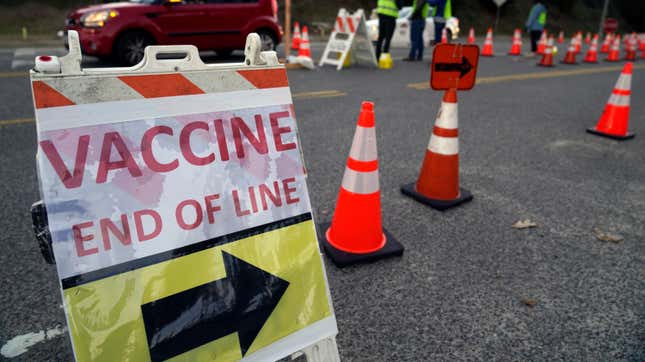
As the U.S. speeds ever closer toward mass vaccination against covid-19, a curious trend has started to emerge on social media and elsewhere: well-intentioned people downplaying the benefits of vaccination, often by arguing that vaccinated people still pose a major transmission risk and that they shouldn’t do things like spend time indoors unmasked around their friends and family.
Not only is this advice unwarranted, though, it’s also self-defeating. Vaccinated people are unlikely to get or spread the virus—especially not to other vaccinated people—and should feel free to socialize in a more normal way. Suggesting that life shouldn’t change at all post-vaccine is a good way to discourage people on the fence from getting the shot at all.
You don’t have to look far to see this sort of vaccine-scolding on Twitter, to the point where the argument itself has now become a ripe source of parody. The same logic has been used to malign some public health experts as well.
Last Monday, Centers for Disease Control and Prevention director Rochelle Walensky went on the Rachel Maddow Show to talk about covid-19 and the vaccines. At some point, in discussing new CDC research, Walensky said: “Our data from the CDC today suggests that vaccinated people do not carry the virus, don’t get sick, and that it’s not just in the clinical trials but it’s also in real-world data.”
Walensky’s comments were soon criticized by outside observers, including scientists, as not completely accurate and therefore irresponsible. A day later, the CDC was forced to walk back her comments, telling the New York Times that “Walensky spoke broadly during this interview” and that it was possible “some people who are fully vaccinated could get Covid-19.”
Walensky should have chosen her words more cautiously, but the firestorm that emerged around her comments and the subsequent framing of the CDC’s walk-back was overblown and imprecise as well. The New York Times story on the CDC’s new statement, for instance, had the headline: “Can Vaccinated People Spread the Virus? We Don’t Know, Scientists Say.” Technically true, but misleading, given what we do know, which is that vaccines largely prevent infection.
The CDC data that Walensky referenced found that the Pfizer/BioNTech and Moderna mRNA vaccines were not only highly effective at preventing illness from the coronavirus—their intended purpose—but also 90% effective at preventing detectable levels of infection from the coronavirus altogether. Without infection, transmission isn’t possible. Other recent research has also shown that when vaccinated people do get infected, they produce lower levels of the virus than non-vaccinated carriers, which should cut down their risk of transmission to others. And when Walensky referenced real-world data, she was likely talking about Israel, where high vaccine uptake has now crushed the spread of the pandemic, partly because the vaccines do significantly reduce transmission.
Again, Walensky shouldn’t have spoken in absolutes. Some people will still get infected and even become sick after being fully vaccinated—events that scientists call breakthrough infections. Sometimes, these people could possibly also transmit the virus to others, particularly unvaccinated people. Other vaccines, such as the Johnson & Johnson one-dose shot, are relatively less effective than the mRNA vaccines, so that should be made clear as well (though Johnson & Johnson’s one-dose shot does seem to also greatly reduce transmission risk).
The CDC accounts for breakthrough cases in its current guidance for vaccinated people, which says that they should still use masks and distancing in public and around unvaccinated people who are at high risk of complications from covid-19. Otherwise, vaccinated people can socialize indoors unmasked with each other and with a single household of unvaccinated people at a time, and they can safely travel, the CDC says.
But while more research will be done to figure out just how likely fully vaccinated people are to transmit the virus, it won’t change the overall picture, based on the data so far: Vaccinated people are highly unlikely to spread the virus. Variants are included in this equation as well, since none in wide circulation appear to substantially reduce the effectiveness of our current vaccines in the U.S.
There are absolutely times where it’s critical to emphasize the uncertainty of important scientific issues and to act especially cautiously in light of that uncertainty. A potential carcinogen discovered in a drug, for instance, might be worth taking out immediately, even if the exact odds of it causing cancer aren’t yet known, since the risk could be high. But telling people that they’ll still be in danger or that their lives shouldn’t change for the better after taking a vaccine isn’t supported by existing science and is likely to turn some people away from getting the shots at all.
The reason why daily cases in the U.S. remain stubbornly high is because there are still millions of unvaccinated people capable of spreading the virus to other unvaccinated people. The pandemic will die down as more and more of us get vaccinated. Vaccinated people socializing together is not going to change this calculation.
None of this is meant to argue against maintaining current precautions like widespread masking in public or avoiding large indoor gatherings. These sorts of interventions are supposed to help drive down the level of ongoing community spread, and they should remain in place until the pandemic is finally and clearly losing steam, not before.
But if you really want to do your part in combatting the pandemic, the best thing to do is to get vaccinated as soon as you can—not scold someone for enjoying the benefits of lab-made immunity.